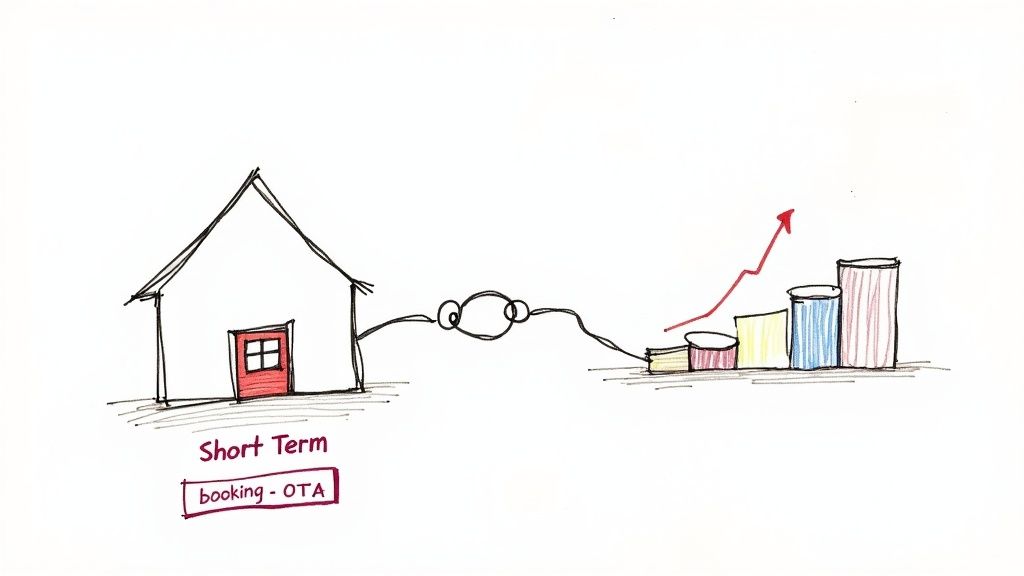
direct booking website
Create a Powerful Direct Booking Website for Short-Term Rentals
Posted on Oct 17, 2025

If you're in the short-term rental game, your own direct booking website is the single most powerful tool you're not using enough. It's your ticket to bigger profit margins and breaking free from the grip of the Online Travel Agencies (OTAs).
By building your own site, you get to say goodbye to those eye-watering commission fees, forge real relationships with your guests, and finally call the shots on your own brand and booking rules. This isn't just a small tweak; it's the strategic move that savvy hosts are making to actually grow their business in a ridiculously competitive market.
Why You Need a Direct Booking Website Right Now

Let's be real for a second. Relying only on platforms like Airbnb and Vrbo is like putting all your eggs in someone else's basket—and that basket is getting pretty shaky. You're living by their rules, paying their fees, and are completely at the mercy of their next algorithm change. A direct booking website puts you back in the driver's seat.
This guide isn't about fluff; it's a straight-to-the-point look at why you need this and how to build a booking engine that actually works for you, not for a third-party giant. It's about creating a business asset that will last.
Navigating a More Competitive Market
The short-term rental scene has exploded. It's crowded out there. Between 2020 and 2024, the market got flooded with a 62% surge in active Airbnb listings in the U.S. alone. This gold rush of new investors triggered a race to the bottom on pricing, squeezing margins for everyone.
To even stay in the game, 83% of property managers are now forced to tweak their prices at least weekly, often with dynamic pricing tools. This is the new reality. A direct booking website is your best defense, letting you sidestep the OTA fee bloodbath and build a loyal following that comes back to you, not to Airbnb. If you want to dive deeper into these market shifts, check out the insights over at Enso Connect.
A direct booking website is no longer a "nice-to-have"—it's a core component of a resilient short-term rental business strategy. It's your defense against market saturation and your path to higher profitability.
OTA Bookings vs Direct Bookings Key Differences
Seeing the side-by-side comparison really drives home the value of taking bookings yourself. Here's a quick look at how things stack up when you ditch the middleman.
| Feature | OTA Bookings (e.g., Airbnb, Vrbo) | Direct Bookings (Your Website) |
|---|---|---|
| Booking Fees | You and your guest get hit with combined commissions of 15% or more. | You only pay payment processing fees (around 3%). That's a huge saving. |
| Guest Communication | All communication is filtered and monitored through the OTA's platform. | You have a direct line to your guests from day one. No restrictions. |
| Guest Data | The OTA owns the guest's data, making it nearly impossible to re-market to them. | You own all your guest data. Hello, email marketing and repeat bookings! |
| Brand Control | Your brand is just a tiny logo on their massive platform. | You have 100% control over your brand, your messaging, and your rules. |
The differences are stark. One path keeps you dependent, while the other puts you in full control of your business's future.
By the time you finish this guide, you'll have a clear, actionable roadmap to plan, build, and launch a powerful direct booking website for your short-term rental that fattens your wallet and secures your independence.
Building Your Brand Before You Build Your Website

It's tempting to jump right into picking out a slick website template. I’ve seen it a hundred times. But hitting pause and figuring out your brand first is what separates the forgettable listings from the ones that get booked solid.
Before you touch a single color palette or think about payment processors, you need a brand. It’s your story, your promise to the guest, and your secret weapon in a crowded market. It's the foundation for your entire direct booking website for short-term rental. Without it, you're just building a pretty house with no soul, and travelers can spot that from a mile away.
Who Are You Really Hosting? Define Your Guest Avatar
This is the single most important question you’ll answer. If your answer is "everyone," you're actually targeting no one. Get specific. You need to build a "guest avatar"—a crystal-clear picture of your ideal visitor.
Are you trying to attract:
- The Digital Nomad? This person lives and dies by fast Wi-Fi. They need a proper workspace (not a wobbly kitchen stool) and flexible check-in times. Your brand needs to scream efficiency and comfort.
- The Adventure-Seeking Family? They’re looking for durable furniture, kid-friendly touches, and insider tips on the best local trails. Your brand story is all about creating unforgettable family memories.
- The Luxury Weekender Couple? They expect high-thread-count sheets, a chef’s kitchen, and a curated list of the best local restaurants. Your brand must communicate sophistication and exclusivity.
Once you know exactly who you're talking to, every other decision snaps into place. Your website copy, the style of your photos, even the name you give your property should speak directly to that person.
Your brand isn't just a logo; it's the emotional connection a guest feels with your property before they even arrive. It’s the difference between them booking a place to stay and booking an experience they’ll remember.
What’s Your Story?
People don’t just buy what you do; they buy why you do it. Your brand story is the soul of your business, the narrative that makes your property more than just four walls and a roof.
Maybe the cabin was built by your grandfather, and you’re carrying on a legacy of craftsmanship. Or perhaps you’re an interior designer who poured every ounce of your creativity into making a stylish urban retreat. This is the stuff that adds depth and authenticity—something the big, faceless OTAs can never truly replicate. This narrative becomes a cornerstone of your website, especially on your "About Us" page. If you want to dig deeper, our guide on how to build brand awareness has some great tips.
Turning Your Brand into Website Must-Haves
With your ideal guest and brand story locked in, you can now outline the non-negotiable features your website needs. This isn't some generic checklist; it's a strategic blueprint tailored to your brand.
Let’s get practical:
- Targeting families? Your site needs a page dedicated to family-friendly amenities, with photos of kids actually enjoying the space. A blog post titled "Top 5 Kid-Friendly Hikes Near Our Cabin" would be pure gold.
- Attracting remote workers? You better have Wi-Fi speed test results front and center, along with photos of the dedicated workspace and a few testimonials from other digital nomads. A calendar that clearly shows long-stay discounts is a must.
- Selling luxury? Your website demands impeccable, professional photography and maybe even a walkthrough video. An integrated booking engine that lets guests add on a private chef or in-house massage isn't just a nice-to-have; it's an expectation.
Doing this branding work upfront ensures your website becomes more than just a functional tool—it becomes a powerful machine for conversions. Every single element will be aligned with one goal: attracting your ideal guest and convincing them that booking directly with you is the best decision they can make.
Choosing Your Website Technology Stack
Picking the technology to build your direct booking website for short-term rental is one of those foundational decisions that echoes for years. It will shape everything from your day-to-day workload to your long-term growth. Get it right, and you’ve built a smooth, automated engine for your business. Get it wrong, and you’re signing up for a constant stream of technical headaches.
This isn't just about choosing a pretty template. It's about finding a "tech stack" that actually fits your budget, technical comfort level, and how many properties you manage. Let's walk through the three main paths hosts and managers usually take.
All-in-One Website Builders
Think of these as your "business in a box." Platforms like Lodgify or Uplisting are designed from the ground up for the vacation rental world. They bundle everything you need—a website builder, a booking engine, and usually a channel manager—into one neat package.
The biggest draw here is simplicity. You can often pull your listings directly from Airbnb and have a professional, fully functional website up and running in a few hours, not weeks.
- Best For: Hosts with 1-10 properties who want speed and simplicity more than deep customization.
- Pros: Insanely fast setup, built-in booking and payment systems, automatic calendar syncing that prevents double bookings.
- Cons: You're limited on the design front (you're basically using their templates), and you're locked into their ecosystem.
For a lot of hosts, this is the perfect starting point. It clears away the technical hurdles so you can focus on what matters: marketing your properties. To see a full breakdown of the players, check out our guide on the best website builder for vacation rentals.
WordPress with Booking Plugins
This is the happy middle ground, offering a potent mix of flexibility and control. WordPress is the open-source platform that powers a huge chunk of the internet. On its own, it’s a content management system, but its real magic is in the massive library of plugins.
You can add a specialized booking plugin, like MotoPress Hotel Booking, and turn a standard WordPress site into a powerful direct booking machine.
This approach gives you almost limitless design freedom. You can add any feature you can dream up, from slick photo galleries to a blog about the best local coffee shops. The trade-off? It comes with a steeper learning curve and more hands-on management. You're the one in charge of hosting, security, and keeping everything updated.
Fully Custom-Built Solutions
This is the top-shelf option, usually reserved for large property management companies or hosts with a very specific vision and a budget to match. A custom-built site is created from scratch by a team of developers, tailored to your exact needs.
You get total control over every pixel and line of code. This lets you craft a completely unique guest experience and integrate with any other software you use. For instance, you'll want it to talk seamlessly with your property management software, which is a non-negotiable tool for any serious operator.
A custom solution gives you unparalleled control, but it also demands the biggest investment of time and money. It’s an enterprise-level decision, not a starting point for most hosts.
The global vacation rental market is expected to hit $105.7 billion by 2025. While OTAs still handle around 85% of bookings, a growing number of savvy owners are carving out their independence and boosting their profit margins with their own platforms.
Ultimately, the right tech stack boils down to your business goals. A host with two cabins will probably do great with an all-in-one builder. A manager juggling 50 urban apartments, on the other hand, will likely need the power and scale of a WordPress or custom solution. Choose the path that empowers you to grow, not the one that holds you back.
Designing a Website That Turns Lookers Into Bookers

Let's be honest, a pretty website is nice, but a high-converting one pays the bills. Your design choices directly impact whether a visitor hits "Book Now" or bounces right back to Google. This is where we get practical about the design and user experience elements that actually drive revenue for your direct booking website for short-term rental.
The real goal here is to make a potential guest feel so connected to your property that booking directly feels like the most natural, obvious choice. It’s all about mixing stunning visuals with a dead-simple user journey.
Your Most Important Investment Is Visual
Before you even think about fancy widgets or complex animations, let’s talk about your single most critical investment: professional photography and, increasingly, videography. I've seen it time and time again—cell phone pictures just don't cut it anymore. You’re competing with listings that look like they were pulled from a magazine.
High-quality images are what initially grab a guest's attention and get them daydreaming. They need to be bright, crisp, and tell a story about the experience you’re offering. A shot of a crackling fireplace with two glasses of wine nearby sells a romantic escape far better than a sterile, wide-angle photo of a living room.
Getting your visual content right, especially with professional video, is absolutely essential to captivate potential guests. It's worth your time to learn more about mastering social video production, as you can create compelling clips that are perfect for your homepage and social media feeds.
Writing Descriptions That Sell an Experience
Once your killer photos have hooked a visitor, your words need to seal the deal. The single biggest mistake I see hosts make is writing property descriptions that are just a boring laundry list of amenities. Nobody gets excited about reading "3 bedrooms, 2 baths, Wi-Fi included."
Instead, you need to sell the experience.
Instead of: "Deck with chairs."
Try: "Sip your morning coffee on the private deck as you watch the sunrise over the mountains."
Instead of: "Fully equipped kitchen."
Try: "Unleash your inner chef in our gourmet kitchen, stocked with everything you need to prepare a memorable family dinner."
This approach helps guests visualize themselves in your space, creating an emotional pull that a list of features never will. Weave in specific details that speak directly to the ideal guest you're trying to attract.
Building Unshakable Trust with Visitors
Booking directly with an independent manager requires a leap of faith for travelers used to the safety net of big OTA brands. Your website's job is to build that trust—and build it fast.
Here are the non-negotiable trust signals you must have:
- Prominently Display Guest Reviews: Don't bury your glowing testimonials on some forgotten page. Sprinkle them throughout your site, especially on property pages and right next to the "Book Now" button. Social proof is your best friend.
- A Personal 'About Us' Page: This is your chance to connect on a human level. Share a friendly photo of yourself or your team and explain why you love hosting. People want to book with people, not a faceless corporation.
- Clear Contact Information: Make it incredibly easy for guests to get in touch. A visible phone number, email, and a simple contact form show you’re a real, accessible business.
A well-designed website does more than just show off your properties; it builds confidence. Every single element, from your photos to your personal story, should work together to assure guests they're making a smart, safe choice by booking with you directly.
Creating a Frictionless Booking Process
All the beautiful design in the world won't save you if the booking process is a clunky nightmare. Simplicity is everything. A visitor should be able to go from interested to booked in just a handful of clicks.
Your booking engine needs big, clear "Book Now" or "Check Availability" buttons on every single page. The calendar has to be easy to read and navigate on both a laptop and a phone. Remember, just a 1-second delay in page load time can cause a 7% drop in conversions, so make sure your site is blazing fast.
By focusing on these core principles—investing in visuals, selling the experience, building trust, and simplifying the booking journey—you'll turn your website from a simple online brochure into a powerful conversion machine. For more inspiration, check out our deeper dive into vacation rental website design for even more actionable ideas.
Driving Consistent Traffic to Your New Website

So, your new direct booking website is live. It looks amazing. But now comes the real challenge: getting people to actually find it. A beautiful site with zero visitors is just a digital billboard in the desert.
The goal isn't just a quick burst of traffic; it's about building reliable, consistent streams of potential guests that don't hinge entirely on pricey ad campaigns. Let's dig into the marketing playbook—the foundational, organic strategies that will bring your ideal guests right to your digital front door, time and time again.
Mastering Foundational SEO for Rentals
Search Engine Optimization (SEO) sounds way more intimidating than it is. For a short-term rental manager, it really just means helping Google understand exactly what you offer and who you're offering it to. When a potential guest searches for a place to stay, you want to be right there at the top of the list.
The trick is to think like your guest. They aren't just typing in "vacation rental." They're getting specific, and that's where you can shine.
Long-Tail Keywords: Forget broad terms. Focus on the hyper-specific phrases that signal someone is ready to book. Instead of "cabin in North Carolina," think bigger—or, rather, longer. Target something like "Asheville cabin with hot tub and mountain view." These phrases have way less competition and attract people who know exactly what they want.
On-Page SEO: Weave these specific phrases naturally throughout your website. They should appear in your property titles, your detailed descriptions, and even your photo captions. Every single property deserves its own dedicated page, optimized with unique content that sells the experience.
Local SEO: For most rentals, the local search game is everything. You're trying to capture guests looking for a place in your specific town or region. A massive piece of this puzzle lives outside your actual website.
Your Google Business Profile Is Non-Negotiable
One of the most powerful—and completely free—tools you have is your Google Business Profile (GBP). Seriously. When someone searches for "places to stay in Scottsdale," what's the first thing they see? Usually, it's a map with a handful of business listings. You need to be on that map.
Go claim and meticulously fill out your profile. This isn't a "set it and forget it" task. Add stunning, high-quality photos. Make sure your address (or service area) is correct. Add a direct link to your booking page. Write a compelling description.
Most importantly, make it a non-negotiable part of your process to ask every single guest to leave you a Google review. Those star ratings are pure gold for building trust and have a direct impact on how high you rank in local searches.
Think of your Google Business Profile as your digital storefront on the world's largest search engine. Neglecting it is like having a shop on Main Street but keeping the blinds closed.
Create Content That Attracts Your Ideal Guest
Content marketing isn't just some fluffy concept for big corporations. For a rental business, it's about providing genuine value that draws in your target audience long before they've even thought about pulling out their credit card. Your website's blog is the perfect place to do this.
But here’s the secret: don't just write about your property. Write about the experience that surrounds it.
- Got a beach house in Florida? Write a post titled "The Ultimate Guide to a Family-Friendly Week in Clearwater."
- Manage a ski chalet in Colorado? Create a guide on "The Top 5 Après-Ski Spots in Breckenridge You Can't Miss."
This kind of content is magnetic for people in the early planning stages of their trip. You instantly become their trusted local expert. When it's finally time to book a place, whose property do you think will be at the top of their mind? This strategy turns your direct booking website for short-term rental into a go-to resource, not just another sales page.
And the trend is clearly moving in this direction. In the U.S. alone, direct booking websites now capture nearly 34% of all vacation rental bookings. That's a huge slice of the pie, second only to Airbnb. It means roughly one in three guests is actively looking to bypass the OTAs, hoping to save on fees and connect directly with hosts like you. You can find more great insights on how to maximize these direct booking trends on Hostaway.com.
Beyond Google: Building a Real Community
While SEO is your long-term bedrock, you can't put all your eggs in the Google basket. You also need to build relationships where your potential guests are already hanging out. Social media and email marketing are perfect for this.
A Smart Social Media Strategy
- Choose Your Platform Wisely: You don't need to be everywhere. If your properties are gorgeous and photogenic (and they are!), then Instagram and Facebook are your best friends. Focus your energy on sharing stunning photos, quick video tours, and content from your past guests.
- Engage, Don't Just Broadcast: It's called social media for a reason. Ask your followers questions, run fun polls, and make a point to respond to every single comment. The goal is a two-way conversation that makes people feel connected to your brand.
- Partner with Local Influencers: Find local travel bloggers or Instagrammers and invite them for a stay. A collaboration can get your property in front of a whole new, highly engaged audience.
Email Marketing for Repeat Bookings Your email list is your single most valuable marketing asset. Why? Because you own it. No algorithm can take it away from you. Every guest who books should be added to your list (with their permission, of course). Use it to nurture those relationships and drive that lucrative repeat business.
Send out things like:
- Exclusive "welcome back" discounts for past guests.
- Updates on cool local events or seasonal attractions near your properties.
- A simple, friendly "We miss you!" email a few months after their stay.
By combining solid SEO with valuable content and genuine community building, you create a powerful, self-sustaining marketing engine that drives the right kind of traffic straight to your website.
Got Questions About Building a Direct Booking Site? We've Got Answers.
Jumping into building your own direct booking website for your short-term rentals is a big move. It’s totally normal for a bunch of practical questions to pop into your head once you start thinking it through. Understanding the benefits is one thing, but dealing with the real-world stuff—cost, time, and effort—is another beast entirely. Let’s break down some of the most common hurdles property managers run into.
How Much Is This Actually Going to Cost Me?
This is usually the first question on everyone's mind. And the answer is... it depends. The cost can swing wildly, from a simple monthly subscription for a site builder to several thousand dollars for a fully custom-built website.
But honestly, the better question is about the return on your investment. OTA commissions can easily gobble up 15% or more of your revenue from every single booking. When you compare that to a direct booking site's flat fee or small processing charge, you can see how quickly you'll make back your initial investment. Sometimes, it only takes a handful of successful direct bookings.
What if I'm Not a Tech Whiz?
Another huge worry is the tech side of things. The thought of having to become a web developer overnight is enough to scare off most busy property managers.
Good news: you don't have to. The technical skills needed really vary depending on the path you choose:
- All-in-one builders: Platforms like Lodgify are designed for beginners. If you can upload photos and fill out a form, you have all the skills you need to get a professional-looking site up and running.
- WordPress with plugins: This route has a bit more of a learning curve. You’ll need to get comfortable with the WordPress dashboard, figure out how to install plugins, and handle some basic updates. But you definitely won't need to write a single line of code.
- Custom builds: Here, you hire a professional. Your only job is to communicate what you want your site to look and feel like—you're the visionary, not the coder.
Don't let the fear of tech hold you back. Modern tools are built specifically to empower people who aren't developers to create awesome, functional websites.
How Do I Handle Payments Securely?
Processing payments is a big deal, and it should be. Guests are smart to be cautious about punching in their credit card info on a site they've never used before. Secure payment handling isn't just a feature; it's essential for building trust and protecting your business.
You're going head-to-head with the built-in trust of giants like Airbnb and Vrbo. Your payment process has to be absolutely seamless and bulletproof to give guests the confidence to book with you directly.
Luckily, you don't have to reinvent the wheel. Reputable payment gateways like Stripe and PayPal integrate smoothly with just about every website builder and booking plugin out there.
These services do all the heavy lifting—security, encryption, PCI compliance—making sure your guests' payment details are locked down tight. Setting one up is usually as simple as connecting your account. You get to offer a trusted, secure checkout without ever having to manage sensitive financial data yourself.
Ready to build a website that not only looks great but also drives bookings on autopilot? hostAI offers intelligent website creation with built-in tools designed to convert visitors into guests. Explore how our platform can help you grow your direct bookings.